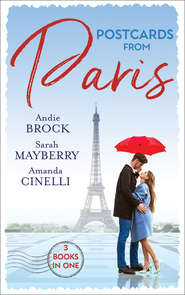По всем вопросам обращайтесь на: info@litportal.ru
(©) 2003-2025.
✖
Island Heat
Автор
Год написания книги
2018
Настройки чтения
Размер шрифта
Высота строк
Поля
To either side of the kitchen on the plasma screens, images from her digital library flashed on the screen—spice markets, beachside traders, laughing brown-skinned children, colorful Carnival parades.
“Contrary to common belief, not all Caribbean food is hot and spicy,” Tory said. “Island food can be infinitely subtle, but it can also punch you in the face with fiery heat. Over the cruise we’ll sample a number of famous islander dishes like jerk chicken, johnnycakes, rum cakes and rum punches. I’ll show you how to select the best spices and herbs for your cooking, how to store them and mix them and the best cuts of meat for each dish. Island food is casual, family fare, and most of the recipes we’ll explore are simple and don’t require elaborate preparation or long cooking times. I guarantee that by the time you go home you’ll be ready, willing and able to treat your family and friends to a Caribbean feast.”
She spent the remainder of her first lecture familiarizing her audience with the individual cuisines of the various islands they would be visiting, focusing particularly on providing a context for their first stop in St. Bart’s the following day. Once she was finished, she opened the floor to questions and spent a further ten minutes elaborating on her lecture. She was flattered to learn that many of the guests had read her book—one woman confessed that Tory’s recipes had in fact inspired her to take the cruise in the first place—and by the time she’d said goodbye to the last guest and turned off the audio-visual equipment, she was feeling flushed with achievement.
If it hadn’t been for the fact that Ben Cooper would arrive tomorrow morning, she would be a happy woman indeed. She caught sight of herself in the tinted glass of the oven door, and the nervous feeling in the pit of her stomach increased tenfold as she frowned at her wildly curling hair. Okay, Ben Cooper and her hair—if she could just fix those two things, she’d be over the moon.
Yesterday morning she’d made the unpleasant discovery that she’d left her beloved hair-straightening iron behind in New York. She’d scrabbled through her suitcase, pointlessly tossing around the few items she’d left unpacked as she’d searched in vain for the trusty appliance. She had a very clear picture of it on her bed at home, cord wrapped tightly around the handle, ready to go in her case. Unfortunately it hadn’t actually made it in, and now she was faced with the prospect of being a human fuzz-ball for the entire cruise.
Ever since she’d been a teen, Tory had hated her curly hair. In senior high, before she’d discovered the modern wonder of the straightening iron, she’d worn a scarf to bed to try and flatten her unruly head of hair. By the time she was twenty she had managed to tame the fuzz with salon treatments and daily use of a straightening iron and she’d never looked back. Now, however, she was in a bind. There was a hair salon on board, but it was expensive and already overbooked. She had vague ideas of picking up a new straightening iron in St. Bart’s when they docked, but she knew she might not have a chance to go ashore since Ben was coming on board and they needed to sit down and talk about the rest of the lecture series. Short of not washing her hair for the entire cruise, she’d quickly realized that in the short term she was going to have to endure the curls.
Shoving a fistful of golden-blond fluff behind her ear, she turned away from her reflection. Perhaps if she just avoided any and all reflective surfaces, she could pretend she looked the way she always did—cool, elegant, in control. For some reason, it felt very important that Ben Cooper see her that way when he came on board tomorrow.
Ready to finish up for the day, she saw that someone had left a newspaper folded on a seat in the front row. Hoping against hope that it was a New York Times, Tory veered from her course to the door to pick it up. She saw immediately that it was a local weekly paper, the Island Gazette, but decided to read it anyway. It might not be quite the lifeline to the outside world that she’d been looking for, but it would do.
She didn’t see the photograph until she’d settled down in the bar with a glass of single-malt scotch on the rocks. She almost swallowed the whole lot in one gulp when she flicked the page over and saw the boy. There were a number of colorful shots making up the double-page spread on recent pre-Carnival parades on various islands. But her gaze flew to the central photograph—a shot of a delighted crowd cheering on a parade.
There, in the front row, his face turned toward the camera, was a small boy with bright blue eyes and dusky skin. Perhaps it was the startling blue of his eyes against his dark complexion or the fact that he was surrounded by dozens of brown-eyed, brown-skinned children or the fact that he seemed to be looking directly down the lens of the camera. Whatever it was, it made the breath catch in the back of her throat, and she sucked in too much whisky as she tried to recover. She coughed till her eyes watered, the paper rattling in her hands, and she brushed the tears away impatiently. It was dark in the Emperor’s Club, the very masculine cigar bar she’d chosen to enjoy her drink, and no matter how she angled the paper, she couldn’t get enough light on the image. She surged abruptly to her feet and strode out into the corridor, then stopped to stare intently at the photograph under the brighter light.
Blue eyes. A small, neat nose. Dark brown curly hair. A cleft chin. And…She peered closer and a chill stole up her spine. Just visible on the side of the boy’s neck was a birthmark.
Her head shot up, and she glanced first left and then right, trying to get her bearings. She was on the sixth deck, one level above her own. Feeling a strange compulsion, she found the nearest staircase and wove her way through the corridors back to her cabin.
The instant she was in her room she booted up her laptop and scrolled through her digital library until she found her folder of family snaps. She’d scanned in a bunch of images from old family albums a while ago, liking the idea of having them easily accessible no matter where she went. The shot she’d been looking for filled the screen as she double-clicked on it. Her heart pounding stupidly against her rib cage, Tory compared the two faces—the little boy from the paper and the little boy on her computer screen. The similarity between the two was uncanny. Same nose. Same chin. Same eyes. Same birthmark.
The boy in the crowd, whoever he was, was the spitting image of her twin brother, Michael, at age seven.
She knew it could just be a coincidence. Lots of people had blue eyes, even among the islanders, where brown was the predominant color. Plenty of people had cleft chins, too, although it was a reasonably rare genetic trait. But the birthmark…Her eyes traveled from the newspaper photograph of the boy to the old shot of her brother. Just visible against the neckline of Michael’s T-shirt was the dull red of a port-wine-colored birthmark. The same birthmark that her father had and her grandfather before him and his father before him. It was a Fournier family legacy, that birthmark, passed on from father to son for more generations than anyone could remember.
So what was it doing on the neck of this blue-eyed, smiling boy?
Her gaze dropped to the caption beneath the photograph. Crowds welcome the arrival of Carnival season, it read. She felt a ridiculous sense of disappointment. What had she expected, after all—that the boy’s name would be there, listed alongside everyone else in the crowd?
Tossing the newspaper onto her bed, Tory ran her fingers through her unruly mop of hair. What she was thinking was crazy. Surely it was. There was no way that boy in the photograph could be her brother’s son.
And yet…
She remembered the way her eyes had zeroed in on him right from the start. The jolt of recognition she’d felt when she’d looked into his face. He looked so much like Michael. And that birthmark…What if he was Michael’s son? What if there was still a piece of her brother alive in the world, a living legacy? Tears burned at the back of her eyes at the thought. Michael’s son. It would be amazing. A miracle. A gift.
Suddenly the utter absurdity of what she was contemplating hit her, and she recalled her mother’s parting words at the airport: “I hope you can let go of him at last, Tory. You can’t carry all that sadness around with you forever.”
She scrubbed her face with her hands, then shook her head at her own thoughts.
What she’d been thinking was impossible. Too crazy. Too convenient. An artifact of her inability to move on from the loss of her twin, nothing else. For eight years she’d missed him every single day. But it was time to move on. What had just happened showed her that beyond a doubt.
You’re here to say goodbye, not build castles in the air, she reminded herself.
Snatching up the newspaper, she tossed it in the bin. Moment of craziness gone, she assured herself. Never to be seen again.
Except that night she dreamed of Michael.
They were standing on a beach, the sand stretching away on either side of them, endless, limitless, the water in front of them a bright, crystal blue. Michael was crying, a lone tear sliding down his sun-tanned cheek, his arms held before him in bewilderment, as though something had just been taken from him and he couldn’t quite believe it.
She ran to his side, threw her arms around him, welcomed him back. But it was as though he couldn’t hear or see or feel her. He just kept staring at his outstretched, beseeching arms.
“Where is he? I’ve lost him,” he said, and her heart broke at how shattered he sounded.
“Who have you lost, Michael?” she asked, trying to make him acknowledge her. “Tell me.”
But he turned away from her and walked away.
“Where is he?” she heard him yell at the sea, his voice half angry, half fearful.
And then she woke up.
She was damp with perspiration, her face wet with tears. Kicking herself free of her tangled sheets, she staggered into her bathroom and flicked on the light. She looked terrible—puffy-eyed, shaken.
“It’s just a stupid dream,” she told her reflection.
But the memory of it stayed with her and kept her staring at the ceiling until her alarm went off at seven.
She sat up and saw the chef’s whites she’d laid out the night before. Today was the day Ben Cooper came aboard. So much for feeling cool and in control and elegant. She’d had next to no sleep, her hair was a disaster and she was feeling more vulnerable than she’d felt in years.
Great, she thought sourly. Way to go, Tory.
He was going to take one look at her with those cocky, all-seeing eyes of his and know he had her whipped before he even started.
BEN SET OUT HAPPILY enough for his one week sojourn aboard Alexandra’s Dream, flying out of the airport on the neighboring island of St. Maarten early in the morning. His good mood lasted until he spotted Monty Blackman as he disembarked into the airport terminal on St. Bart’s. The man stood out like a sore thumb with his garishly bright shirt in hot-pink and lime-green stripes and his baby-blue golf pants. Was the guy color-blind? And where did he find such ridiculous stuff, anyway? Ben figured he’d have to search every island in the Caribbean chain before he could come up with such a bad-taste ensemble.
The last thing he wanted was to talk to the smug, leathery-skinned bastard. Even though Danique was the one who had perpetuated the fraud that Ben was Eva’s father, it was Monty he resented the most—Monty with his oily smile and his string of cheap tourist motels and his bad taste in fashion. It seemed impossible that a child as sweet and beautiful as Eva could have been fathered by someone so unworthy. For the first few days after he’d found out Ben had toyed with the idea of demanding a DNA test just in case Eva was really his. But in his gut he’d known Danique was telling the truth.
Turning a shoulder, Ben took pains to keep a huddle of tourists between the two of them as he made his way to the exit.
“Cooper! Just the man I’ve been meaning to see!”
Ben closed his eyes in frustration as Monty’s voice echoed along twenty feet of concourse. Forcing a neutral expression onto his face, he turned.
“Monty,” he said, flicking his wrist over to check the time ostentatiously. “Can’t really talk right now, sorry—got a boat to catch.”
“This won’t take a minute. I wanted to talk about Danique and the little one.”
Ben ground his teeth together. Eva, he wanted to say. Her name is Eva. Danique and I named her because you were too busy covering your ass to be bothered.
“I really don’t think now’s the best time—” he tried again, but Monty just talked overtop him.
“I know you’ve been helping Danique out with making ends meet, paying for the little one’s odds and ends, medical bills, whatever. I just wanted to make things square with you now that things have been sorted out.”
Ben was gripped with an icy anger as he saw Monty pull out his checkbook. “Like I told Danique, I don’t care about the money,” he said, turning away.











